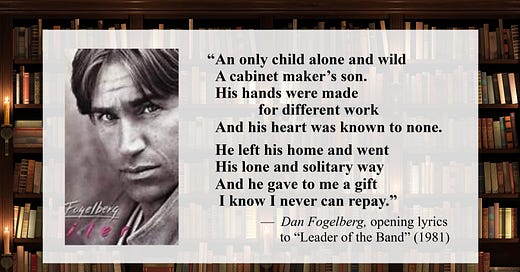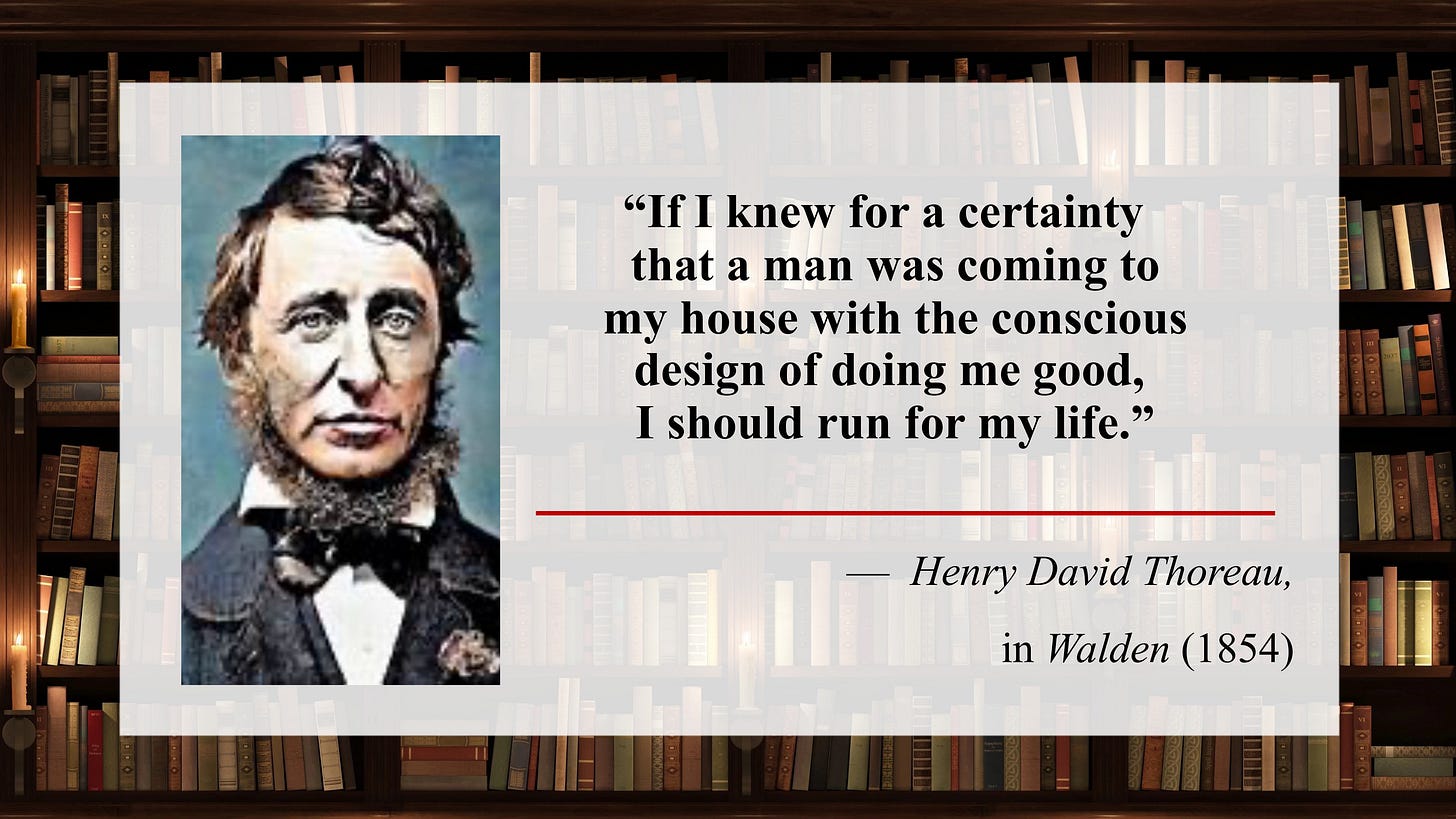Dr. Mardy's Quotes of the Week ("Doing Good")
June 15 - 21, 2025 | THIS WEEK'S THEME: “Doing Good"
On this one special day in which we honor the role of fathers in human life, take a moment to reflect on the dads you’ve known and, for many of you men out there, the dad you’ve been.
When we see adult children truly honoring their fathers, our hearts are warmed—and our eyes often moistened. For me, there is no better tribute than “Leader of the Band,” Dan Fogelberg’s 1981 song about his father, Lawrence Fogelberg, a musician and leader of a number of high school and college marching bands. It’s an amazing song, and it begins beautifully:
Mr. Fogelberg died a year after the song was released, and I’ve often thought about what it must have been like when his son said, “Dad, I’ve written this song for you, and I hope you’ll like it.” Fogelberg believed it was the best song he ever wrote. To hear him express that thought and see him perform the song, click the link below—and don’t forget to have a tissue handy:
Opening Line of the Week
In the spirit of this week’s theme, Angier, a Pulitzer Prize-winning writer for The New York Times, might well have answered doing good. And while something like that may have been in the back of her mind, her actual answer went this way:
“Hard as it may be to believe in these days of infectious greed and sabers unsheathed, scientists have discovered that the small brave act of cooperating with another person, of choosing trust over cynicism, generosity over selfishness, makes the brain light up with quiet joy.”
I’m currently working on “The Best Opening Lines of 2025,” and if you’d like to nominate any candidates, e-mail them to me at: drmardy@drmardy.com. If you recommend a great opener I haven’t yet seen and it makes my final list, I’ll send you a personally-inscribed copy of one of my books.
This Week’s Puzzler
On June 17, 1703, this man was born in Epworth, Lincolnshire, England. The son of a church rector, he became a church deacon in 1725 and an ordained Anglican priest in 1728. While serving as an Oxford lecturer, he and his brother Charles established a small group committed to the systematic pursuit of a devout Christian life.
In addition to Bible study, members devoted significant time to prayer, fasting, and rigorous spiritual self-examination. They also took food to indigent families, visited inmates in local jails and prisons, and taught young orphan children how to read. Instead of earning the respect of their peers, they were mockingly referred to as “The Holy Club” and their reputation for so methodically engaging in religious activities gave birth to the derisive term “methodists.”
After spending some time in church missionary work—including a two-year ministry in Savannah, Georgia—he returned to London to join a religious society led by Moravian Christians. In 1738, after studying Martin Luther’s writings on the concept of salvation by faith alone, he experienced one of religious history’s earliest “evangelical” conversions.
He soon began his own ministry, but, over time, the fervency of his preaching alienated so many higher-ups in the Church of England that he found himself on the fringes of the church. As the years passed, though, he gradually attracted more converts, and he ultimately adopted the term “Methodism” to describe his evangelical religious movement. One of religious history’s most popular sayings is associated with him:
In Letters of ____ ______ (1915), this quotation—in this precise phrasing—was attributed to him under the title “Rules of Conduct.” Because the book was edited by George E. Eayrs, a respected Methodist leader at the time, there seemed little reason to doubt the quotation’s accuracy. There were a couple of red flags, though. Eayrs buried the passage in a footnote, and, in a book filled with exact citations, one was not provided for this passage. Scholars now regard the quotation as apocryphal, and likely written by someone familiar with our Mystery Man’s writings—possibly Eayrs himself—and likely motivated by a desire to “improve” on somewhat similar sayings from his sermons. Here are two examples:
Who is this person? (Answer below)
How Good Have You Been at Doing Good?
Over the years, many of my favorite historical figures have tried to guide their lives by the simple premise of doing good. You see that expressed quite clearly in the three quotations above. However, in his classic The Rights of Man (1791), Thomas Paine expanded on the idea considerably when he wrote:
“My country is the world, and my religion is to do good.”
Abraham Lincoln once expressed a similar sentiment. In their 1889 biography The True Story of a Great Life, William H. Herndon and Jesse W. Weik recounted something the 16th president said he’d heard—and deeply admired—from an old man during a church service:
“When I do good, I feel good, when I do bad, I feel bad, and that’s my religion.”
Is it possible to construct a religion—or at least a philosophy of living—on such a simple principle? Many have tried. A number of years ago, I learned that Benjamin Franklin regarded the idea of doing good as a core principle of his life.
In a 1993 Pennsylvania Gazette article, historian Michael W. Zuckerman reported that, as Franklin awakened each morning, he thought to himself, “What good shall I do today?” and just before going to bed, he reflected, “What good have I done today?” Franklin also expressed the following thought on the subject in a 1745 issue of Poor Richard’s Almanack (italics mine):
“Serving God is doing good to man, but praying is thought an easier service and therefore more generally chosen.”
This quotation, along with his morning/evening regimen, described earlier, reflected Franklin’s practical, Enlightenment-era emphasis on virtue through direct action rather than solitary prayer. For Franklin—and for so many others since—doing good was the truest form of religious practice.
Somewhere around the 16th-century, the expression doing good became something of an all-encompassing phrase to capture the essential message of Jesus. In those two simple words, a wide variety of practices were suggested, including being kind, acting with compassion, serving others, giving freely and generously, and showing love and charity to all people. According to the apostle Luke, Jesus famously used the expression himself in The Sermon on the Mount:
I have since determined that the do good expression shows up in numerous biblical passages, including the brief sampling below (italics mine):
“He [Jesus] went about doing good and healing all that were oppressed by the devil, for God was with him.” — Acts 10:38 (RSV)
“Trust in the Lord, and do good; so you will dwell in the land, and enjoy security.” — Psalm 37:3 (RSV)
“Do not neglect to do good and to share what you have, for such sacrifices are pleasing to God.” — Hebrews 13:16 (RSV)
Given the deep history of doing good in the Christian tradition, it is more than a little ironic that the phrase has also been warmly embraced by agnostics, atheists, secular humanists, and others who’ve explicitly rejected religion as a foundational belief system. You saw a good example of that earlier with Thomas Paine’s observation that “My religion is to do good.”
Paine was a classic Enlightenment thinker who was not simply critical of organized religion, he rejected the authority of the Bible, the idea of divine revelation, the divinity of Jesus, and pretty much everything else that fell under the rubric of church dogma. In his view, an enlightened religion was not about creeds and doctrines, but about how we treat other people. This gave rise to the view that simply doing good is a central tenet of a secular philosophy of life—one grounded in the belief that, even without a belief in God, human beings can use reason to guide them in living honorable and exemplary lives.”
Virginia Woolf once cleverly piggybacked on Paine’s thinking when she referred to the whole idea of doing good as an “atheist’s religion.”
In the novel, written in the aftermath of “the war to end all wars,” the protagonist is Mrs. Ramsay, a compassionate and socially responsible woman who holds no illusions about a divine presence in her life. In the passage above, Woolf suggests that it is possible for a person to be deeply moral not from religious faith or a belief in God, but purely from a sense of ethical responsibility. This, of course, captures the essence of what is now called secular humanism—the view that, even without belief in God, we can—and indeed must—consciously choose to live morally upright lives.
In today’s world, the phrase doing good has largely shed its religious connotations and is now commonly used alongside secular expressions like doing well and doing great. Here’s a popular example:
This comes from Quindlen’s bestselling book (well over a million copies sold), an expanded version of a commencement address she planned to deliver—but did not actually give—at Villanova University’s graduation ceremonies in 1999. Quindlen withdrew from the event after learning that a group of conservative students were planning to demonstrate against her appearance. She explained that she didn’t want to “ruin the day or cast a shadow” on the ceremonies, adding: “I don’t think you should have to walk through demonstrators to get to your college commencement.”
After she e-mailed the text of her speech to a Villanova student who expressed disappointment at missing it, the written address quickly went viral. It is now often described as one of history’s best commencement speeches, even though it was never formally delivered. Elements of the speech—along with thoughtful commentary on it by Maria Popova—may be seen here.
Let me bring my remarks to a close this week by asking a simple question. If doing good is such an honorable and admired practice, then why would an esteemed figure like Henry David Thoreau write the following?
I won’t be answering the question today, but I plan to do so in a future issue. I haven’t settled on a title yet, by I’m leaning toward the following: “How to Do Good without Becoming a Do-Gooder—or Worse.” If you’d like a visual preview of the upcoming theme, see the featured cartoon below.
This week, take a few moments to think about how good you’ve been at doing good. As usual, let your thinking be stimulated by this week’s compilation of quotations on the subject:
Keep doing good deeds long enough, and you’ll probably turn out a good man. In spite of yourself. — Louis Auchincloss
Do not run after happiness, but seek to do good, and you will find that happiness will run after you. — James Freeman Clarke
What greater bliss than to look back on days spent in usefulness, in doing good to those around us. — Dorothea Dix
To be good, we must do good; and by doing good we take a sure means of being good, as the use and exercise of the muscles increase their power. — Tryon Edwards
He who fasteth and doeth no good saveth his bread but loseth his soul. — Thomas Fuller
I believe…that every human mind feels pleasure in doing good to another. — Thomas Jefferson
He who waits to do a great deal of good at once, will never do any thing. — Samuel Johnson
The happiest people I know are people who don’t even think about being happy. They just think about being good neighbors, good people. And then happiness sort of sneaks in the back window while they’re busy doing good. — Harold Kushner
Oh! What a Godlike Power is that of doing Good! — Samuel Richardson
Every man has to seek in his own way to do some good. Every man has to seek in his own way to make himself more noble and to realize his own true worth. — Albert Schweitzer
For source information on these quotations, and more observations on the theme of DOING GOOD, go here.
Cartoon of the Week:
Answer to This Week’s Puzzler
John Wesley (1703 - 91)
Dr. Mardy’s Observation of the Week
Thanks for joining me again this week. See you next Sunday morning, when the theme will be “Living in the Here & Now.”
Mardy Grothe
My Two Websites: www.drmardy.com and www.GreatOpeningLines.com
Regarding My Lifelong Love of Quotations: A Personal Note
















Mardy, I appreciate the quality of your writing. Amazing. I love the Dan Fogelberg song. I heard a story about John Wesley years ago. Wesley drew large crowds to his meetings and someone asked him why. He reportedly said: “I put John Wesley on fire and people come to watch him burn.” I don’t know if it is true.
Thanks for doing Good with another thought provoking post. Happy Father's Day, indeed!
One Bible passage you might find illuminating is James 2:14-26 with a commentary about faith without works is dead.
Building on the mystery person, the Wesleys directly inspired the Booths who founded The Salvation Army, an organization, which is at its core a church, in which the officers (the ones you see in the iconic military-style uniforms), all of whom are ordained ministers, appear to live their faith by their works and encouraging other to do likewise. This church has become among the largest charities in the world and around 15 years ago adopted the tagline "Doing the Most Good." I'm not a huge fan of the tagline, because good is in the eye of the beholder. This could be seen as someone imposing their faith on others through their works, although my nearly decade of involvement with the organization has not revealed this to be the case with their works.
While the Salvation Army serves without discrimination and is generally lifting others up, we all can undoubtedly think of the numerous examples where religious zealots have done their version of "good" by cleansing the world of what they perceive as evil through murder and other sub-homicidal malicious acts. I struggle to see how people who claim to be Christians would murder others in Jesus' name, since I don't understand how that could in any way be considered an example of Jesus' core message of "love your neighbor."
Echoing Arlene's comment and my response to you about the "Charity" post from a couple of weeks ago, works of good should be looked at from the perspective of the receiver and not the giver. When the act of "goodness" is from the giver's perspective, it could result in birdshit philanthropy, where the giver drops off something no longer useful to the giver without regard for what it does for the receiver. As noted in my previous communication, this can be paralyzing and create dependence rather than independence. An economy-wide example of this is all the charity pouring into Haiti that has systematically driven local businesses bankrupt, like the rice farmers who cannot compete with free, and created a country that has difficulty providing for itself.